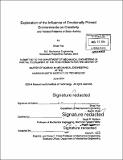Exploration of the influence of emotionally primed environments on creativity and related patterns of brain activity
Author(s)
Yue, Shuai, S.M. Massachusetts Institute of Technology
DownloadFull printable version (8.665Mb)
Other Contributors
Massachusetts Institute of Technology. Department of Mechanical Engineering.
Advisor
David R. Wallace.
Terms of use
Metadata
Show full item recordAbstract
Creativity is needed in almost everything we do. In the process of product design, it is very important to concept generation in early phases. Two behavioral studies were conducted to investigate whether environments with emotional stimuli would influence creativity, and in particular divergent thinking capacity. The stimuli independently considered were music and pictures. These stimuli sets had been previously studied by psychologists from a neuroscience and brain activity viewpoint. It was found that the positive emotional environments, both auditory and visual, enhanced divergent thinking capacity, while the negative emotional environments were detrimental. The participants in the positive emotional environment outscored in the creativity task with over 90 percent statistical significance. In order to begin to search for mechanisms behind the environmental effects, a meta-analysis, building upon the related brain imaging findings provided insights from the neuroscience perspective. This analysis suggested that the brain regions of the dorsolateral prefrontal cortex (DLPFC), anterior cingulate gyrus (ACC), and anterior insula are active under both stimuli associated with increased divergent thinking. Future work is needed to investigate specifically how these brain regions may affect creativity and design cognition and whether there is an effect of their interactions.
Description
Thesis: S.M., Massachusetts Institute of Technology, Department of Mechanical Engineering, 2014. Cataloged from PDF version of thesis. Includes bibliographical references (pages 85-93).
Date issued
2014Department
Massachusetts Institute of Technology. Department of Mechanical EngineeringPublisher
Massachusetts Institute of Technology
Keywords
Mechanical Engineering.